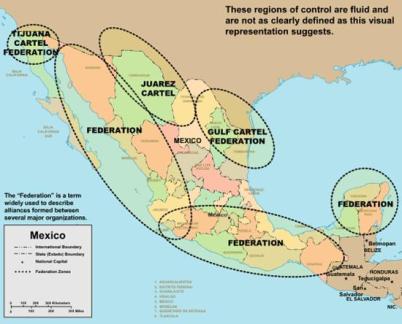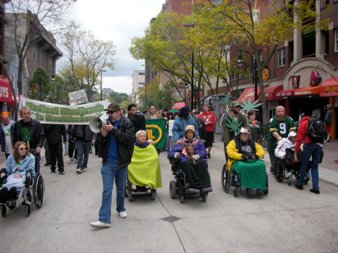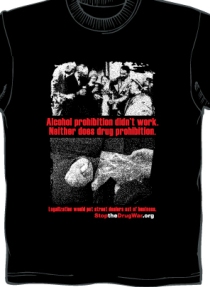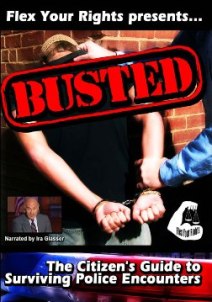Medical marijuana is coming to the nation's capital. The question now is how good the DC City Council will make the program. Some advocates are happy with the progress, while others fear the restrictions could doom the program to fail.
It wasn't just the scent of pot smoke that hung in the air over 4/20 events around the country this week, it was the sense of imminent change. And even drug reform leaders who had been leery of such Cannabis Nation celebrations are coming to grips with their grassroots.
The Mexico Drug War Update was on vacation last week, but now it's back. Weirdly enough, 420 people were killed in prohibition-related violence there in the past two weeks. Nothing to celebrate about that.
StoptheDrugWar.org is pleased to be the first drug policy organization to offer this important new video to our members -- your donations will support our work of building the movement and fueling public debate, too.
A coke-peddling NYPD cop cops a plea, a Florida deputy provides a favor to the wrong woman, and a New Orleans jail guard gets caught peddling pot to a prisoner.
We're already $1.2 billion into helping Mexico try to wage prohibition on its powerful and violent drug trafficking cartels. Now, border congressmen want another $500 million in an emergency appropriation this year.
Two national polls on marijuana legalization came out this week. One lowballs support levels at 33%, while the other is in line with other recent polls at 44%. In either case, we're not over the top yet, except maybe out West.
Can that legalization initiative in California really pull it off? A new poll has some encouraging numbers.
A majority of Canadians think marijuana should be legalized, according to a new poll. They also approve of harm reduction -- even if the Conservative government doesn't.
Wisconsin won't be the 15th state to approve medical marijuana, at least not this year. The session ended yesterday with no Assembly floor vote.
Events and quotes of note from this week's drug policy events of years past.
"Marijuana Will be Legal Soon (And if You Don't Like it, Move to Canada)," "Blogger Forces Drug Czar's Office to Correct False Information," "Happy 4/20," "Will the Economic Argument Help Legalize Marijuana? Yes," "Three Reasons to Legalize Marijuana Now."
Apply for an internship at DRCNet and you could spend a semester fighting the good fight!
Do you read Drug War Chronicle? If so, we need your feedback to evaluate our work and make the case for Drug War Chronicle to funders. We need donations too.
The District of Columbia City Council Tuesday unanimously approved regulations for a DC medical marijuana program, but some patient and provider advocates are concerned the measure is too restrictive. The measure must be voted on again next month, and then approved by Congress under DC Home Rule law.
Under the measure approved by the council, DC residents who suffer from HIV, cancer, glaucoma, or a "chronic and lasting disease" will be able to possess up to two ounces of marijuana in a 30-day period after presenting a doctor's recommendation. Patients will not be able to grown their own medicine, but will be able to purchase it through one of five medical marijuana distribution centers. Patients, designated caregivers, and distributors will register with the city Department of Health and be provided with ID cards.
Distributors will be limited to growing no more than 95 plants and must be located at least 300 feet from schools. The original version of the legislation had a 1,000-foot location restriction, but that was reduced after advocates said it would make it nearly impossible to find suitable locations in the city.
"This legislation seeks to avoid problems while assuring the District moves forward with a medical marijuana program that is based on evidence and best practices," said council member David A. Catania (I-At Large), chairman of the Health Committee.
The Tuesday vote is one of the last steps in the more than decade-long struggle to bring medical marijuana to the District. Voters approved a medical marijuana initiative with 69% of the vote in 1998, but DC officials were blocked from implementing the will of the voters by the Barr amendment, named after then Rep. Bob Barr (R-GA). That amendment was only removed last year, after Democrats regained control of the Congress. DC officials are counting on Congress to look the other way when asked to approve the measure later this year since federal law does not recognize medical marijuana.
While many medical marijuana supporters are happy with the measure, others fear it is so restrictive it will defeat its purpose. "We're happy that they passed it -- some cities have yet to enact any legislation -- but we have some concerns with the language that is currently in there," said Nikolas Schiller, secretary for the DC Patients' Co-op and member of Americans for Safe Access DC chapter. "There is no home cultivation for patients. In 1998, District residents voted legal cultivation at home, but this measure removes that language," he said.
"Patients can only use or possess cannabis at home," Schiller went on. "The council is coming from a perspective where they don't want coffee shops or places where people can medicate together, but this will be an onerous restriction on patients. People who rely on medication for work will have to leave work and go home to medicate."
Patient advocate and StoptheDrugWar.org assistant director David Guard took issue with the council's failure to include chronic pain in its list of allowable conditions. "Chronic pain isn't in there, and that's deplorable," he said. "In DC, 3% of the population suffers from HIV/AIDS, but according to national figures, 30% of the population suffers from chronic pain. I'm sick of people turning their backs on chronic pain."
Schiller also criticized the Council's decision to make distributors for-profit operations. "The original language allowed for nonprofit corporations, and Catania is on record as saying they only want to use best practices from other states, but only Colorado has the for-profit model included," he noted. "From a medical perspective, the for-profit model is seen as being part of the larger health care industry. People feel that for-profit distribution works against the best interests and needs of the patients and for the business's shareholders and boards of directors."
He also took issue with the 95-plant limit, saying it could prove insufficient for patient demand and that it could lead to distributors choosing fast-flowering strains instead of those best suited for patients. "The reality is that 95 plants will not be enough at the beginning because they won't know what the demand is," Schiller said. "If they can only grow 95 plants and it's a for-profit business, they will want to produce as much medicine as possible, leading to strains that grow quickly."
The council will vote again on the measure on May 4, and then Congress will have 30 days in which to approve it. That means DC could have a working medical marijuana system before year's end. It also means that advocates will have one more shot at getting a better program.
"We're thankful that the Council has been proactive and understands the need for medical marijuana," said Schiller. "We are hoping to influence the Council to change this for the better, and we are lobbying our elected officials to make those changes."
back to top
Tuesday was 4/20, National Weed Day -- or whatever you want to call it -- and America's Cannabis Nation celebrated it with clouds of marijuana smoke on college campuses and city parks across the land. This year, 4/20 felt a little different, with attendees buoyed by a sense of impending change and the suit and tie wearing movement worriers a little less concerned about how mass pot parties will play with the public. It wasn't just clouds of pot smoke in the air, but the scent of looming change, too, was palpable.
|
|
|
CU Boulder time-lapse video |
More than 10,000 people rallied in Denver and another 10,000 or so did so 35 miles away at the University of Colorado in Boulder. Hundreds more at the University of California at Santa Cruz celebrated with a mass light-up at 4:20pm. San Francisco's Golden Gate Park hosted thousands more happy puffers, while in Washington, DC, the party was inside. Well-attended 4/20 events also took place in Seattle and Boston, while smaller celebrations of the stoner holiday took place all across the country, including dozens of college campuses.
In New Hampshire, about 100 people rallied in the state capital of Concord, while in Juneau, Alaska, about 20 people, two dogs, and a mother pushing a stroller braved driving rain as they marched past the state capitol and city hall, chanting "Yes, we cannabis!" Oakland got a head start on 4/20 when the recently opened iGrow marijuana cultivation supply shop held a 4/20 Eve party, complete with a Hummer serving as a smoking room.
Local NORML chapters in Philadelphia, Minneapolis, and Tucson held events, and the Seattle Hempfest held a 420 Members' Social, while New York City was the scene of a 4/20 rally. The date was commemorated with cannabis competitions in Oakland and Olympia, Washington, and marked by celebrations in San Diego and Los Angeles, as well.
And, as compiled by Celeb Stoner, and suggestive of the growing cultural impact of 4/20, the day was marked by concerts, record releases, and movie screenings linked to cannabis culture. Famous tokers Cypress Hill played San Francisco, while Snoop Dogg played New York, Willie Nelson performed in Topeka, Sublime played in Los Angeles, and Slightly Stoopid played in Austin. Cypress Hill, fellow tokers the Kottonmouth Kings, Devin the Dude, and Nelson all released albums on 4/20.
Pot-friendly comics also got into the act. Doug Benson did a 4/20 show in Minneapolis, Sarah Silverman did one in New York City, and Ngaio Bealum played San Francisco.
Theaters in Boston, Chicago, Denver, Los Angeles, New York, and Washington, DC, marked 4/20 with screenings of the "Phish 3D" movie, while in Calgary, Alberta, the 4/20 Film fest featured thematically appropriate films like "Johnny Appleweed," "Blaze," and "400 Bowls."
This year's 4/20 events come as the sense of momentum toward legalization grows palpable, with a legalization initiative headed for the November ballot in California and polling above 50%. (See related stories this issue here and here.) Meanwhile, legalization initiative signature gathering campaigns are underway in Oregon and Washington, so there is a chance the whole West Coast could vote to free the weed this fall.
4/20 also came on the heels of two events, one in San Francisco and one in Colorado Springs, that strongly suggest marijuana is going mainstream. In San Francisco, the International Cannabis and Hemp Expo drew about 15,000 of visitors over the weekend. Vendors there offered up everything from coffee cops emblazoned with marijuana leaves to a 52-foot mobile grow trailer, and a doctor was on hand offering medical marijuana recommendations for $100.
In Colorado Springs, meanwhile, Colorado's first Medical Cannabis Expo was also attended by thousands of people. The Expo comes at Colorado's medical marijuana scene it taking off in ways reminiscent of California's "Wild West" days of just a few years ago and as Colorado legislators work desperately to rein it in. The Expo saw dozens of vendors, including lawyers, dispensary owners, and realtors, and made evident that marijuana is a big and growing business in the state.
While in the past, some prominent drug reform movement leaders have criticized 4/20 and similar events as counterproductive and promoting stoner stereotypes, those critiques were less prominent this year. In fact, at least two reform leaders, Bill Piper of the Drug Policy Alliance and former Seattle Police Chief Norm Stamper of Law Enforcement Against Prohibition published pieces urging 4/20 celebrators to put down the joint -- at least for a moment -- and pick up the pen. 4/20 is not just a party, they suggested, but a time to stoke activism as well.
"While I certainly wish we could get 10,000 to come out to rally in support of an initiative or a legislative agenda, the reality is that more people are prone to show up when it entails smoking in public," said Mason Tvert of Colorado-based SAFER (Safer Alternatives for Enjoyable Recreation). "It's part of this movement, and it needs to be embraced. These are organic, grassroots events that are growing in popularity and are being normalized," he said.
"I don't tell everyone to light up and get high," Tvert continued. "I say I hope you will show this same level of excitement and enthusiasm when there is something on the ballot. Trying to tell 10,000 people who are using marijuana that they're doing something wrong is not terribly helpful, so I told them to think about how nice it was to light up with that overt fear of punishment and how great it would be if they use marijuana without fear everyday and they should be supporting organizations that will help them achieve that," he said. "With events like this, all we can do is try to ride the beast."
"I went down to the gathering in Golden Gate Park," said Ethan Nadelmann, executive director of the Drug Policy Alliance. "You had thousands of people primarily in their 20s hanging out and smoking marijuana. It was peaceful, friendly, and remarkable diverse, and I think that in itself is significant. There were no speeches, no organized entertainment, just people hanging out, but also making something of a political statement."
The Drug Policy Alliance has decided that the stoner celebrations aren't necessarily are a bad thing, said Nadelmann. "We've reached a bit of consensus that to the extent the gatherings are large in number and fairly well-run, they are a net plus," he said. "But if they're small and scraggly, they're probably not a plus and could be a negative."
Like Tvert, Nadelmann acknowledged the grass-roots nature of 4/20. "The drug reform movement didn't create 4/20, and people are going to gather and do this regardless of what the drug reform movement says. The operative question for us is how to make the most of these events, and we are focusing on trying to turn them into more political events. It would have been nice to have even a few minutes with the crowd Tuesday to get it one step more political."
Even the Marijuana Policy Project, which specializes in working the corridors of power, had little bad to say about 4/20. "Our approach to improving marijuana laws is to take it from a serious lobbying position," said Mike Meno, the group's communications director. "But at the same time, we rely on grassroots support from people who are passionate about the issue, and many of them like 4/20. While we would prefer a more buttoned-down approach, we don't discourage anyone from getting involved in other ways. We just ask that they do so with a focus on what is going to help and improve our chances," he said.
Still, Meno said, those sorts of events can cut for or against reform. "It's sort of a double-edged sword," he reasoned. "It's great if there's a big turnout and people see how diverse it is and how much support there is for changing the law, but on the other hand, if only a half-dozen people show up, maybe it's not the best thing image-wise."
4/20 may have come and gone this year, but the sense of imminent victory apparent at the events will linger into the election season. Next year, 4/20 may be about celebrating the first major step toward national pot legalization -- winning a victory in California, and maybe Oregon and Washington, too.
back to top
by Bernd Debusmann, Jr.
Mexican drug trafficking organizations make billions each year smuggling drugs into the United States, profiting enormously from the prohibitionist drug policies of the US government. Since Mexican president Felipe Calderon took office in December 2006 and called the armed forces into the fight against the so-called cartels, prohibition-related violence has killed over 19,000 people, with a death toll of nearly 8,000 in 2009 and over 3,000 so far in 2010. The increasing militarization of the drug war and the arrest of several high-profile drug traffickers have failed to stem the flow of drugs -- or the violence -- whatsoever. The Merida initiative, which provides $1.4 billion over three years for the US to assist the Mexican government with training, equipment and intelligence, has so far failed to make a difference. Here are a few of the latest developments in Mexico's drug war:

DEA Mexican drug cartel map
In Acapulco, six people were killed during a shootout between federal police and drug traffickers suspected to be tied to Edgar Valdez Villareal. At least three of the dead were bystanders caught in the crossfire, among them a mother and her 8-year old child. One 26-year old individual was taken into custody.
Sunday, April 18
In Tepic, Nayarit, three men were killed at a funeral home. The men were paying respects to a suspected retail-level drug dealer that had been executed on Friday. In the previous few days, three other people thought to be involved in the Tepic drug trade had been gunned down. The killings are thought to be a power-struggle following the capture of several local bosses.
Monday, April 19
In Tamaulipas, a shootout occurred between the army and suspected drug traffickers. At least three gunmen were killed and at least four soldiers were wounded. Seventeen individuals were taken into custody. The battles began when gunmen attacked soldiers on a recon patrol in the city of Ciudad Aleman. The three gunmen were killed in the return fire. Thirty-two rifles were seized, as well as 7,000 rounds of ammunition and six vehicles.
In the city of Chihuahua, a former TV anchor was gunned down as she bought food from a street vendor. An unidentified young man that accompanied her was also killed. Isabella Cordova had previously been the main anchor on the Cada Dia television program, and more recently worked as the PR director for the Mexico City Chamber of Commerce. The two were attacked by gunmen wielding automatic weapons.
In Culiacan, Sinaloa, an inmate in prison for federal crimes was shot dead in his cell by at least two gunmen. In Guamuchil, Sinaloa, two people were murdered, including a female school teacher. Two people were killed in Mazatlan, and a police commander was killed in Michoacán. In Tijuana, one man was shot dead by customs officers, and in Jalisco, a police official was killed when assailants raked his home with gunfire.
Wednesday, April 21
In Cuernavaca, two men were found dead outside a bar. A note left at the scene claimed that 25 members of a group allied to Hector Beltran-Leyva are currently being held and interrogated in the city of Acapulco, after which they are to be executed. Cuernavaca has seen a rise in drug-related violence as US-born drug trafficker Edgar Valdez Villareal battles Hector Beltran-Leyva for control of the Beltran-Leyva organization, which was left without a leader following the December killing of Arturo Beltran-Leyva by Mexican naval commandos.
In Nuevo Leon, four police officers were wounded after the checkpoint they were manning was attacked by gunmen. In Leon, Guanajuato, two families were attacked by gunmen, leaving four dead and another wounded. In Michoacán, at least three people were killed, including a gunman who died during a clash with the army. At least four people were killed in Jalisco, three in Sinaloa, two in Tijuana. A union leader was gunned down in Guerrero, and two people were killed and another wounded after an incident in Acapulco.
In Monterrey, gunmen kidnapped six people from two hotels. Initial reports indicate that between 20 and 30 gunmen were led by a handcuffed captive to the fifth floor of the Holiday Inn, where they went room-to-room looking for specific individuals. Three male guests and a receptionist were taken, and another receptionist was taken from the Hotel Mision across the street. A private security guard who was posted outside the Holiday Inn is also reported missing, but it is unclear if he was kidnapped as well.
In the suburbs of Mexico City, gunmen clashed with soldiers, leaving two gunmen dead and another wounded. The incident came after soldiers launched a raid to capture Gerardo Alvarez Vasquez, a presumed member of the Beltran-Leyva Cartel. Vasquez, who was captured, is thought to be partly responsible for the wave of violence which has struck the states of Guerrero and Morelos recently.
Total Body Count for the last two weeks: 420
Total Body Count for 2010: 3,141
Total Body Count for 2009: 7,724
Total Body Count since Calderon took office: 19,452
Read the last Mexico Drug War Update here.
back to top
 It's here. The "10 Rules for Dealing with Police" DVD. Donate $30 or more and get a free copy mailed within one week. It's here. The "10 Rules for Dealing with Police" DVD. Donate $30 or more and get a free copy mailed within one week.
|
| From the creators of the classic, Busted: The Citizenâs Guide to Surviving Police Encounters (2003), our friends at the group Flex Your Rights are now releasing their new achievement, 10 Rules for Dealing with Police. Because StoptheDrugWar.org (DRCNet) members like you supported Busted, you've earned the first chance to see this important new DVD.
10 Rules for Dealing with Police, a 40-minute educational drama, is the most sophisticated and entertaining film of its kind. Narrated by the legendary trial lawyer William "Billy" Murphy, Jr. (from HBO's The Wire), 10 Rules depicts innocent people dealing with heavy-handed policing tactics used every day in the United States.
Through extensive collaboration with victims of police abuse, legal experts and law enforcement professionals, Flex Your Rights has developed a powerful multi-language (English, Spanish & Arabic) resource that provides proven survival strategies for dealing with racial profiling and police abuse.
Do you know what your rights are if you're stopped by police? Most people don't, and the consequences can be severe. From simple misunderstandings to illegal searches and excessive force, a bad police encounter can happen to anyone. But after watching 10 Rules for Dealing with Police, you'll be more confident and better prepared to handle every kind of police situation.
Get 10 Rules today!
Learn How To...
- Deal with traffic stops, street stops & police at your door
- Know your rights & maintain your cool
- Avoid common police tricks
- Prevent humiliating searches
Bonus Features
- 10 Rules for Non-citizens (en Español)
- Q&A with 10 Rules Creators
- Spanish & Arabic Subtitles
We still offer Busted on DVD, too. Add $25 to your donation for a total gift of $55 and get both videos: 10 Rules AND Busted. Or get two copies of either DVD for $55. It's your choice. You can also add BOTH of our popular anti-prohibitionist t-shirts for your donation of $100 -- a terrific value while you support the important work of StoptheDrugWar.org. Get yours today!
StoptheDrugWar.org is the #1 source for the latest news, information and activism promoting sensible drug law reform and an end to prohibition worldwide. With 1.8 million unique readers in 2009 and with leading news and commentary sources making use of our web site on a regular basis, StoptheDrugWar.org is advancing the drug war debate and growing the drug policy reform movement, helping to start or spark the creation of organizations like Students for Sensible Drug Policy, Flex Your Rights and many others. Our strategy is working, and your generous donation will make a difference during these economically challenging times. Thank you for helping -- we look forward to sending your copy of 10 Rules!
|
| StoptheDrugWar.org is the #1 source for the latest news, information and activism promoting sensible drug law reform and an end to prohibition worldwide. Your donations support our work of building the movement and fueling the public debate! |
10 Rules testimonials:
"The 4th Amendment has been on life support during both the Bush-Cheney and Obama administrations. The clearest and most constitutionally-grounded guide for all of us against this government contempt for our 4th Amendment rights is 10 Rules for Dealing with Police. It should be shown in schools, in local legislatures and in Congress.
Nat Hentoff
"10 Rules will educate all individuals about how to safely exercise their rights and protect themselves against abusive and illegal police behavior. It should be required viewing in high schools across the country."
Prof. Angela J. Davis, Professor of Law, American University Washington College of Law & former Director of the DC Public Defender Service, Author, Arbitrary Justice: The Power of the American Prosecutor
"Chronic disregard for civil rights is tearing apart the fabric of America. Flex Your Rights has hit the nail on the head in this hard-hitting instructional video."
Mike Gray, Author of The China Syndrome and Drug Crazy
"I believe 10 Rules will make an extraordinary contribution to the cause of social justice. Only those police officers who disregard the law have something to fear from its message. As an ex-cop, I thank Flex Your Rights for all you've done and continue to do."
Norm Stamper, Ph.D., Former Chief of the Seattle Police Department & Author of Breaking Rank: A Top Cop's Expose of the Dark Side of American Policing
"I read the 10 Rules screenplay and am thoroughly pleased. It is well written, and I believe it realistically and fairly grasps the issue of racial profiling. Go forward!"
Rev. Reginald T. Jackson, Executive Director, Black Ministers' Council of New Jersey & Pastor, St. Matthew A.M.E. Church
"10 Rules is an outstanding screenplay that resonates with authenticity, ripples with humor, and draws blood with its pointed examination of law enforcement in our cities. America's urban youth will love this movie, which talks straight and provides crucial, relevant advice on how to use America's unique Constitutional protections. Two thumbs up."
Eric E. Sterling, Esq., President, Criminal Justice Policy Foundation & Adjunct Lecturer in Sociology, George Washington University
"Good community policing is impossible when officers disrespect constitutional rights. 10 Rules will help citizens understand their rights and ensure that law enforcement is professional and accountable to the public."
Ronald E. Hampton, Executive Director of the National Black Police Association & former Community Police Officer for the Washington, DC Metropolitan Police Department
|
|
back to top
A coke-peddling NYPD cop cops a plea, a Florida deputy provides a favor to the wrong woman, and a New Orleans jail guard gets caught peddling pot to a prisoner. Let's get to it:

If we can't keep drugs out of the prisons, how can we keep them out of the country?
In New York City,
a former NYPD officer pleaded guilty in federal court Monday to his role in a large-scale drug-selling ring. Former officer Juan Acosta, 34, pleaded guilty to conspiracy to distribute drugs, extortion, and illegal use of a firearm. He and a partner were accused of selling cocaine throughout the city since 2005, and Acosta was also accused of using his position as a beat cop to rip-off a drug courier in 2005. He went down after getting caught in a sting last November where he took $15,000 from a government witness to transport 10 kilos of cocaine from a Long Island warehouse to the Bronx. He faces up to life in prison when he is sentenced July 22.
In Lake Wales, Florida, a Polk County deputy sheriff was arrested last Friday on charges he provided confidential information to a woman who was being surveilled as part of an investigation into a local drug trafficking operation. Deputy Sheriff Joseph Murphy, 41, a 16-year-veteran, admitted to accessing the state Driver and Vehicle Information Database to run a license tag for the girlfriend of the drug ring leader, who said she was being followed by a vehicle. That vehicle turned out to be an undercover police vehicle indeed following the girlfriend, and her call to Murphy was recorded as part of the investigation into the ring. He is charged with unauthorized use of a computer, a third-degree felony, and has been suspended without pay pending termination.
In New Orleans, an Orleans Parish Criminal Sheriff's Office deputy was arrested Wednesday for selling contraband to an inmate. Deputy Joel Johnson, allegedly gave an inmate at the Templeman 5 unit a cell phone and marijuana in exchange for $500. Johnson was a recruit in the deputy training program, but now he will have to find a new career. He was fired upon being arrested. He is charged with one count of malfeasance, as well as drug possession and contraband charges.
back to top
Congressmen from districts along the US-Mexican border are asking for $500 million in emergency federal funds to fight the drug trade along the border. The request came last Friday in a letter from the House Border Caucus to House Speaker Nancy Pelosi urging her to include immediate funding in an emergency supplemental spending package.
The letter requested:
- $202.2 million to hire hundreds of additional US Border Patrol agents and inspection agents at ports of entry to alleviate understaffing.
- $200 million to go toward replacing communications infrastructure used by US Customs and Border Protection (CBP) along remote stretches of the border.
- $50 million to go toward Operation Stonegarden, a federal program that assists local law enforcement in fighting violence and drug and weapon trafficking.
- $39.6 million to screen all CBP agents to prevent infiltration and corruption efforts by cartels.
- $10 million to compensate border region health care providers as they treat individuals wounded in Mexico who cross the border to seek treatment at US hospitals.
"The will of governments in communities in the US and Mexico to combat criminal elements is strong," said the letter written by Rep. Silvestre Reyes (D-El Paso). "The United States Congress must continue to honor that resolve with needed funding to aid those serving on the front lines at this critical juncture."

Merida Initiative photo (from state.gov)
The funding request comes as prohibition-related violence in Mexico continues unabated -- the official death toll now stands at more than 22,000 since 2006 -- and has attracted new concern in the US with attacks on US consulates in Mexico and the killing of three consular employees in Ciudad Juarez.
Mexican President Felipe Calderon, whose decision in December 2006 to go to war against the so-called cartels unleashed the current wave of violence, is coming to Washington next month to meet with President Obama and address both houses of Congress.
"We are hoping to get this funding to the border soon, and we are urging our leaders and colleagues to make it happen," said Rep. Rubén Hinojosa (D-TX). "We want to make sure our federal agents on the border have everything they need to protect themselves, to protect us and to protect the border."
"We want to make sure that the border law enforcement get as much support as they need," said Rep. Henry Cuellar (D-TX). "They understand we're doing as much as we can from Congress to help them supplement the work they do."
Congress has already allocated at least $1.2 billion for anti-drug assistance to Mexico via the 2008 Plan Merida. This additional funding would come on top of that. And there's no guarantee that would be the end of it.
"Our first shot at doing this of course is with the appropriation's emergency funding... if we (get) part of it (at that time) we can always go to the second part which is the regular appropriations," Cuellar said in a telephone Tuesday with the Valley Morning Star. "I feel one way or another we will get a good share of what we are asking for."
back to top
Only 33% of respondents in a new Associated Press/CNBC poll support legalizing marijuana, with a solid majority (55%) opposing it. Decriminalization fared similarly poorly, garnering only 34%, while support for medical marijuana was at 60%.
But the AP/CNBC is a low-end outlier compared to other recent national polls on marijuana legalization and/or decriminalization, finding levels of support about 10 points less than other polls conducted in the past year or so. More in line with other recent polls was a CBS News poll released Tuesday that had legalization support at 44%.
One reason for the low levels of support in the AP/CBC poll may lie in the apparent over-representation of the country's most conservative regions. Thirty-seven percent of respondents were from the South and 22% from the Midwest, while only 18% were from the Northeast and 23% from the West.
Unfortunately, the AP/CNBC poll does not provide a breakdown of support for legalization or decriminalization by region. That information could have provided especially useful insight on support for legalization on the West Coast, where a legalization initiative will be on the ballot in California and legalization initiative signature-gathering campaigns are underway in Oregon and Washington.
But the CBS poll does provide a regional breakdown, and the results have to be encouraging for reformers on the West Coast. That poll found majority support (55%) for legalization in the West, the only region where legalization has a majority. Support was at 44% in the Northeast, 40% in the South, and 36% in the Midwest.
The AP/CNBC poll also suggests that American attitudes toward marijuana legalization are a bit incoherent. While only 33% supported legalization and 34% supported decriminalization, 56% thought marijuana should be treated the same as alcohol (44%) or less strictly than alcohol (12%). Alcohol, of course, is a legal, regulated substance.
Among the 55% of people who said they oppose marijuana legalization in the AP/CNBC poll, 14% said they would support it if state governments could tax the proceeds and use the revenues to fund programs. That would bring support for legalization up to the 40-41% range, more in line with other recent polls, but it will not hearten legalization campaigners hoping that economic arguments will significantly increase support for reforms.
A plurality of respondents to the AP/CNBC poll (46%) did not believe that legalization would have any impact on the economy, although 32% thought it would a positive impact. One in five (21%) thought legalization would have a negative impact on the economy. Still, a solid majority (62%) were up for taxing marijuana if it were legal.
Respondents were evenly divided on the impact that legalization would have on crime. One-third thought crime would increase, one-third thought crime would decrease, and one-third thought there would be no change in crime rates. Respondents were also divided on whether the cost of enforcing marijuana prohibition was worth it. Forty-eight per cent said yes and 45% said no.
Some of the opposition to legalization in the AP/CNBC poll stems from health concerns and fears that marijuana use will lead to hard drug use. A plurality of people (46%) thought legalization would harm the overall health of the country, while 39% thought it would have no effect and 13% thought it would improve health. And while 49% of respondents thought that legalizing marijuana would have no affect on hard drug use levels, a sizeable minority (39%) still adheres to the discredited "gateway theory" that smoking pot pushes people to try harder, more dangerous drugs.
The AP/CNBC poll was conducted April 7-12, 2010 via phone interviews with 1,001 respondents and has a margin-of-error factor of plus/minus 4.3%. The CBS News poll was conducted March 29-April 1 via phone interviews with 858 respondents. It has a margin of error factor of plus/minus 3%. Both polls were conducted using both landline and cell phone numbers.
back to top
A SurveyUSA poll conducted this week for a consortium of California television stations showed majority support for marijuana legalization. An initiative that would do just that, the Regulate, Control, and Tax Cannabis Act of 2010, will be on the ballot in November.
The poll found that 56% of those surveyed responded affirmatively to the question, "Should the state of California legalize marijuana?" That's the same number as supported legalization in a Field poll a year ago this month. In this week's poll, only 42% answered negatively, with 3% undecided.
People under 35 supported legalization by a margin of three-to-one (74%-25%), with support declining to 46% among the 35-to-49 age group, rising to 49% among the 50-64 group, then declining again to 39% among those 65 and older. Among all voters under age 50, support was at 61%, while among those over 50, it dropped to 46%
The poll revealed a significant gender gap, with 65% of men supporting legalization, while a dramatically lower 46% of women supported it. That means legalization supporters will have to work to win over a key demographic.
There was majority support for legalization among all ethnic groups except Hispanics, of whom only 45% wanted to free the weed. Support was highest among blacks (67%), followed by whites (59%), and Asians (58%).
Somewhat surprisingly, there was majority support for legalization in all regions of the state, although only barely, except for the San Francisco Bay area, where support was at 65%. In Central California and the Inland Empire, support was at 54%, and in the Greater Los Angeles area, support was at 52%.
The poll was conducted Tuesday and involved interviews with 500 adults across the state. It has a margin of sampling error of plus/minus 4.4%.
back to top
Marijuana legalization continues to garner majority support in Canada, with 53% of respondents to a new Angus-Reid poll saying they supported legalization. That figure is unchanged from the previous Angus-Reid poll on the issue two years ago.
Support for legalization was highest in pot-producing British Columbia (61%), neighboring Alberta (59%), and Canada's most populous province, Ontario (57%). Legalization had less than majority support only in the Atlantic provinces (47%) and the prairie provinces of Saskatchewan and Manitoba (34%).
But while supporting marijuana legalization, Canadians also indicated they support many of the Conservative government's anti-drug proposals. Most non-controversially, 83% supported introducing a National Drug Control Strategy with media campaigns aimed at stopping young people from using drugs. Even the government's draconian mandatory minimum sentence proposal for marijuana growers and drug dealers won 70% support.
What Canadians do not support is scrapping the previous government's marijuana decriminalization proposal or eliminating harm reduction programs, such as needle exchanges and the Vancouver safe injection site. Only 36% of respondents agreed with those measures.
While support for freeing the weed remains strong in Canada, support for legalizing other drugs, which was never very high, is declining. Only 6% supported legalizing ecstasy, 5% supported legalizing crack, powder cocaine or heroin, and only 4% supported legalizing methamphetamine. All of those figures represent a drop of a least three percentage points from the previous Angus-Reid poll on the issue in May 2008.
Declining support for drug legalization and support for government anti-drug measures may be a consequence of Canadians' fears that the country has a drug problem. Some 42% of respondents think Canada "has a serious drug problem that affects the whole country," while 40% said the problem is limited to certain locales and populations, and only 11% said Canada did not have a serious drug problem.
back to top
Medical marijuana advocates in Wisconsin have been working for a decade to get a bill passed there, and now they will have to wait at least one more year. The legislative session ended Thursday without the Assembly taking a vote on a bill that had already passed the Senate.

Gary Storck leading IMMLY march, October 2009, Madison
Rep. Mark Pocan (D-Madison), one of the main sponsors of the bill, issued a statement saying the bill would not go to the Assembly floor. "It is disappointing to many of us, myself included, that the legislature did not pass medical marijuana this session," he said. "But as I have assured the patient advocates, our efforts enjoyed many successes this year and we came closer to our goal than ever before. This fight is far from over because this issue is far too vital for too many people."
Medical marijuana patient and advocate Gary Storck of Is My Medicine Legal Yet?, the group leading the fight for the bill, told the University of Wisconsin independent daily The Badger Herald that while he was disappointed, he and others would be working through the summer to get referenda on local ballots in support of the issue and may even target specific legislators for defeat. "There's a lot of people in the legislature who just don't get it," Storck said. "We've come to the conclusion that if you can't change the law, maybe you have to change the legislature."
Storck speculated that many solons have errant perceptions of marijuana's harmfulness. "They've been so brainwashed that marijuana is some kind of dangerous, illegal drug, that it's hard for them to think outside the box," Storck said. "Cannabis won't kill you; it won't cause permanent damage. It's definitely something that should be out there."
Look for Storck and IMMLY to be back at again next year, and busy in the meantime laying the groundwork.
back to top
April 25, 1894: The British Indian Hemp Drug Commission concludes that cannabis has no addictive properties, some medical uses, and a number of positive emotional and social benefits.
April 27, 1937: In a statement before the US House of Representative Ways and Means Committee, Clinton Hester testifies that a Washington Times editorial published shortly before Congress held its first hearing on the marijuana issue argued: "The fatal marihuana cigarette must be recognized as a deadly drug and American children must be protected against it."
April 29, 1996: At a speech at a Miami high school, President Clinton calls for a war on drugs -- for the second time. General Barry McCaffrey, the nation's drug czar, told the Cleveland Plain Dealer on May 1 that "everything the president has announced is already being done. There's nothing new here."
April 23, 1998: The Ottawa Citizen reports that Canadians who tell US border officials the truth about their past use of marijuana will be denied entry to America indefinitely.
April 25, 2000: Despite the formal opposition of the Hawaiian Catholic Church, the Hawaii State Senate passes medical marijuana legislation, joining California, Oregon, Washington, Maine, Alaska, and Arizona in shielding medical marijuana patients from criminal prosecution.
April 24, 2001: In Oklahoma, Will Foster, 42, a medical marijuana patient who in 1995 was sentenced to 93 years in prison for growing 39 marijuana plants in his basement, is released on parole. Foster used marijuana to relieve chronic pain caused by acute rheumatoid arthritis. "My medical use of marijuana never interfered with my work, I ran a successful business," said Foster. He added, "I was minding my own business taking care of my health and my family. What was I doing to anybody that got me 93 years?"
back to top
Along with our weekly in-depth Chronicle reporting, DRCNet also provides daily content in the way of blogging in the Stop the Drug War Speakeasy -- huge numbers of people have been reading it recently -- as well as Latest News links (upper right-hand corner of most web pages), event listings (lower right-hand corner) and other info. Check out DRCNet every day to stay on top of the drug reform game! Check out the Speakeasy main page at http://stopthedrugwar.org/speakeasy.

prohibition-era beer raid, Washington, DC (Library of Congress)
Since last issue:
Scott Morgan writes: "Marijuana Will be Legal Soon (And if You Don't Like it, Move to Canada)," "Blogger Forces Drug Czar's Office to Correct False Information," "Happy 4/20," "Will the Economic Argument Help Legalize Marijuana? Yes," "Three Reasons to Legalize Marijuana Now."
Phil Smith posts early copies of Drug War Chronicle articles.
David Guard posts numerous press releases, action alerts and other organizational announcements in the In the Trenches blog.
Again, http://stopthedrugwar.org/speakeasy is the online place to stay in the loop for the fight to stop the war on drugs. Thanks for reading, and please join us on the comment boards.
back to top
Want to help end the "war on drugs," while earning college credit too? Apply for a StoptheDrugWar.org (DRCNet) internship and you could come join the team and help us fight the fight!
StoptheDrugWar has a strong record of providing substantive work experience to our interns -- you won't spend the summer doing filing or running errands, you will play an integral role in one or more of our exciting programs. Options for work you can do with us include coalition outreach as part of the campaign to rein in the use of SWAT teams, to expand our work to repeal the drug provision of the Higher Education Act to encompass other bad drug laws like the similar provisions in welfare and public housing law; blogosphere/web outreach; media research and outreach; web site work (research, writing, technical); possibly other areas. If you are chosen for an internship, we will strive to match your interests and abilities to whichever area is the best fit for you.
While our internships are unpaid, we will reimburse you for metro fare, and DRCNet is a fun and rewarding place to work. To apply, please send your resume to David Guard at [email protected], and feel free to contact us at (202) 293-8340. We hope to hear from you! Check out our web site at http://stopthedrugwar.org to learn more about our organization.
back to top
Do you read Drug War Chronicle? If so, we'd like to hear from you. DRCNet needs two things:
- We are in between newsletter grants, and that makes our need for donations more pressing. Drug War Chronicle is free to read but not to produce! Click here to make a donation by credit card or PayPal, or to print out a form to send in by mail.
- Please send quotes and reports on how you put our flow of information to work, for use in upcoming grant proposals and letters to funders or potential funders. Do you use DRCNet as a source for public speaking? For letters to the editor? Helping you talk to friends or associates about the issue? Research? For your own edification? Have you changed your mind about any aspects of drug policy since subscribing, or inspired you to get involved in the cause? Do you reprint or repost portions of our bulletins on other lists or in other newsletters? Do you have any criticisms or complaints, or suggestions? We want to hear those too. Please send your response -- one or two sentences would be fine; more is great, too -- email [email protected] or reply to a Chronicle email or use our online comment form. Please let us know if we may reprint your comments, and if so, if we may include your name or if you wish to remain anonymous. IMPORTANT: Even if you have given us this kind of feedback before, we could use your updated feedback now too -- we need to hear from you!
Again, please help us keep Drug War Chronicle alive at this important time! Click here to make a donation online, or send your check or money order to: DRCNet, P.O. Box 18402, Washington, DC 20036. Make your check payable to DRCNet Foundation to make a tax-deductible donation for Drug War Chronicle -- remember if you select one of our member premium gifts that will reduce the portion of your donation that is tax-deductible -- or make a non-deductible donation for our lobbying work -- online or check payable to Drug Reform Coordination Network, same address. We can also accept contributions of stock -- email [email protected] for the necessary info.
back to top

 It's here. The "10 Rules for Dealing with Police" DVD.
It's here. The "10 Rules for Dealing with Police" DVD. 






